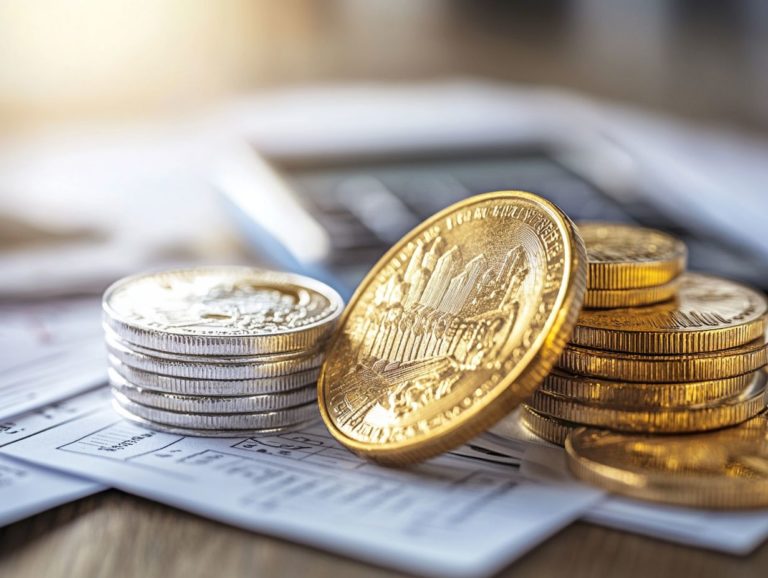Tax Implications of Selling Your Precious Metals Collection
Selling precious metals? Know your tax implications to boost your profits! Selling your precious metals can be an exhilarating journey, but it s essential to grasp the tax implications that accompany it.
From a tax on profit made from selling an asset to the factors that influence your tax rate, making well-informed choices can save you both money and headaches. Whether you re contemplating the type of metal, the time you ve kept an investment before selling it, or your tax filing status, every detail plays a crucial role.
Get ready to discover the rules of taxation! This guide presents strategies to maximize your benefits and offers vital tips for accurate reporting. Don t attempt to traverse this intricate landscape alone read on to arm yourself with the knowledge you need to optimize your precious metal sales.
Contents
- Key Takeaways:
- Tax Implications of Selling Precious Metals
- Factors That Affect Taxation on Precious Metal Sales
- Tax Strategies for Selling Precious Metals
- Tips for Reporting Precious Metal Sales on Taxes
- Alternative Options for Selling Precious Metals
- Frequently Asked Questions
- What are the tax implications of selling my precious metals collection?
- Do I have to pay taxes on the sale of my precious metals collection?
- What tax rate will I be subject to for selling my precious metals collection?
- Are there any exemptions or special rules for selling precious metals?
- What documentation do I need to keep for tax purposes when selling my precious metals collection?
- Can I claim a loss on my taxes if I sell my precious metals collection for less than what I paid?
Key Takeaways:
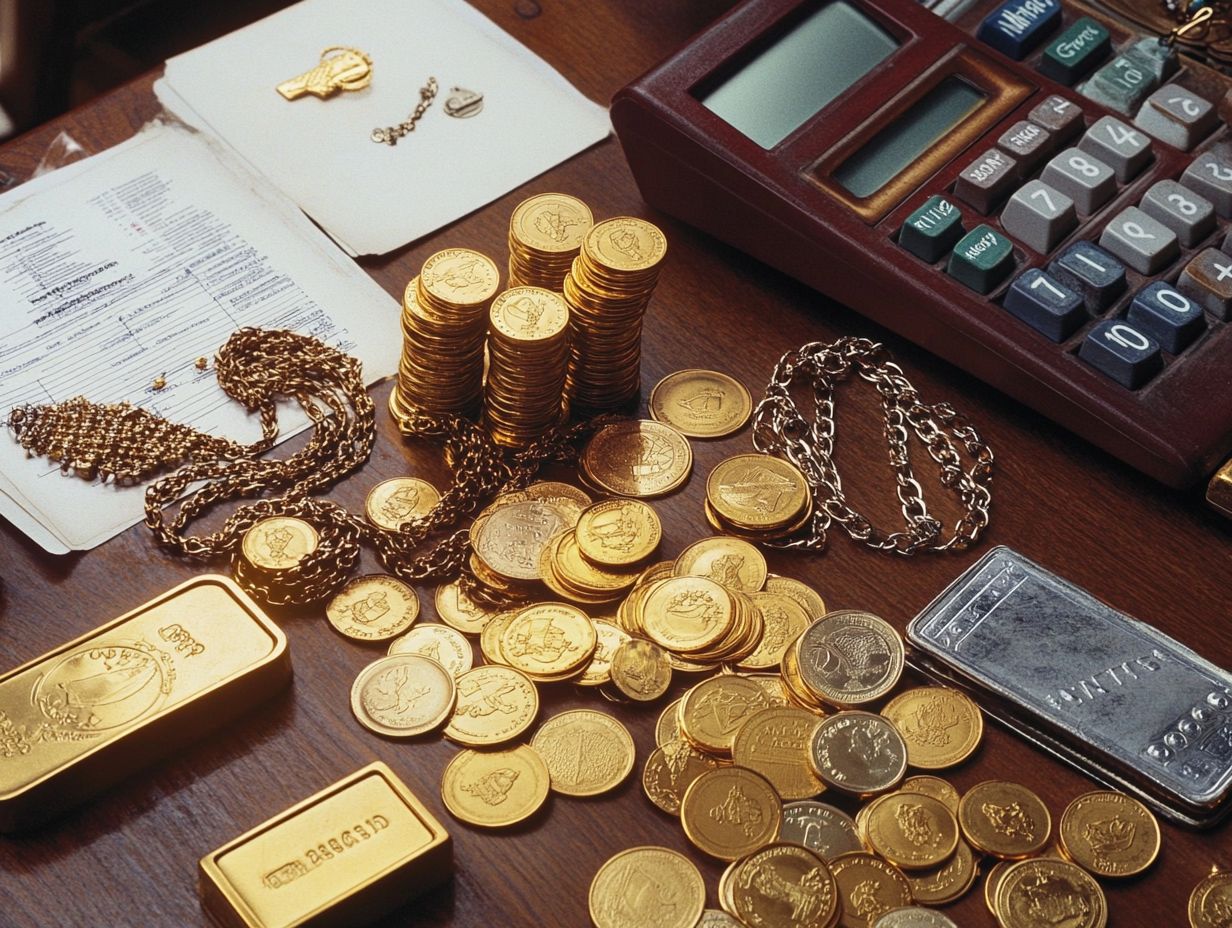
- Selling precious metals may have implications for a tax on profit made from selling an asset, so it’s important to understand how this tax is calculated and how it may affect your profits.
- The type of metal, your holding period, your tax filing status, and your income level can all impact the taxation on your precious metal sales.
- There are tax strategies you can use to potentially maximize your benefits when selling precious metals, so it’s important to do your research and consult with a tax professional.
Tax Implications of Selling Precious Metals
Understanding the tax implications of selling precious metals like gold and silver is essential for you as an investor looking to manage your portfolio with precision.
The Internal Revenue Service (IRS) categorizes these assets based on their type and how long you’ve held them, which can significantly impact your capital gains tax, sales tax, and overall tax liabilities when it comes time to liquidate your investments.
Being aware of these factors gives you the power to make informed decisions that align with government regulations and tax compliance, ultimately helping you optimize your return on investment.
Understanding Capital Gains Tax
Capital gains tax is crucial for you to consider as an investor in precious metals like gold and silver, as it directly influences the profitability of your investment strategy. The IRS distinguishes between long-term capital gains applicable to assets you hold for more than a year and short-term capital gains, which are taxed at a higher rate for assets sold within a year.
Understanding these distinctions is essential for navigating this market. Long-term capital gains usually have lower tax rates, making them a favorable option for those who can hold their precious metals over time.
Short-term gains are taxed like regular income, which can significantly diminish your profits. As a savvy investor, you might explore potential deductions, such as transaction costs or losses from other investments, to help offset some of your tax liabilities.
Planning ahead is key; by setting clear investment goals, understanding the holding periods, and consulting with a tax professional, you can create an effective roadmap to minimize the impact of taxes on your investments.
Factors That Affect Taxation on Precious Metal Sales
Several factors shape the taxation of precious metal sales, particularly the type of metal, your holding period, your tax filing status, and your income level.
For example, gold bars, gold coins, silver coins, and various other precious metals can be classified differently under IRS regulations. This classification can lead to distinct tax implications of buying and selling precious metals based on how long these assets have been held in your investment portfolio.
Type of Metal and Holding Period
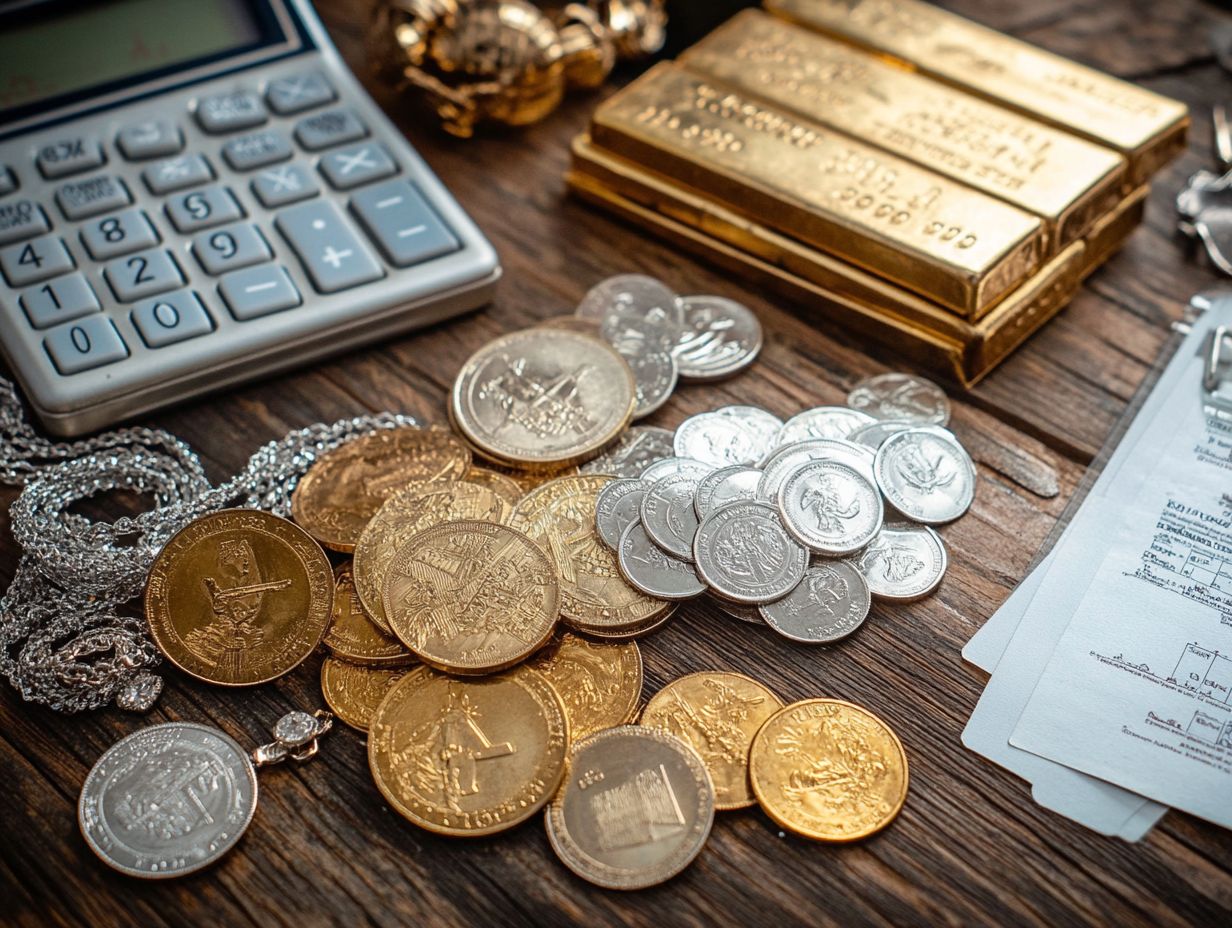
The type of precious metal you choose like gold bullion or silver bars affects your tax obligations. This is especially true based on how long you’ve held these assets.
The IRS classifies these assets based on their form and holding duration, which directly impacts the capital gains tax you’ll incur when you sell.
Gold is often seen as a more stable investment than silver. Holding onto your assets for over a year can lead to lower tax rates, highlighting the importance of timing in your investment strategy.
Different types of assets have various implications. While both gold and silver investments attract capital gains taxes, their market performances can significantly impact your final return on investment.
By understanding the differences between short-term and long-term capital gains, you can effectively strategize, optimizing your tax liabilities as you navigate the market landscape.
Tax Filing Status and Income Level
Your tax filing status and income level can influence the tax consequences of selling precious metals. Different filing statuses can lead to varying capital gains rates, affecting your tax liabilities.
If you’re a single filer, you may face different capital gains rates compared to someone who is married and filing jointly. You may also find that being in a higher income bracket can push you into an even higher tax bracket, leading to elevated capital gains tax rates on your profits.
Understanding these nuances allows you to devise strategic plans like timing your sales or employing tax-loss harvesting techniques to minimize the tax impact while maximizing your returns.
Tax Strategies for Selling Precious Metals
Implementing smart tax strategies can significantly boost your financial health, especially regarding capital gains tax. Understanding deductions and timing your sales can help you reduce your capital gains tax.
Maximizing Tax Benefits
Maximizing tax benefits while selling precious metals requires clear knowledge of applicable tax deductions and your unique financial situation. Aligning your investment strategy with tax implications can minimize capital gains tax and enhance your overall financial outcomes.
One effective technique is leveraging tax deductions related to investment expenses, such as storage fees and transaction costs, which can be deducted from your taxable income. Timing your sales strategically is crucial; for instance, selling in a year when your taxable income is lower can significantly reduce your overall tax burden.
Recognizing eligible expenses, like appraisals or marketing for higher-end assets, can further decrease your taxable earnings. By maintaining detailed records and understanding tax code provisions, you can implement these strategies effectively, resulting in more favorable tax treatments that align with your wealth-building goals.
Tips for Reporting Precious Metal Sales on Taxes
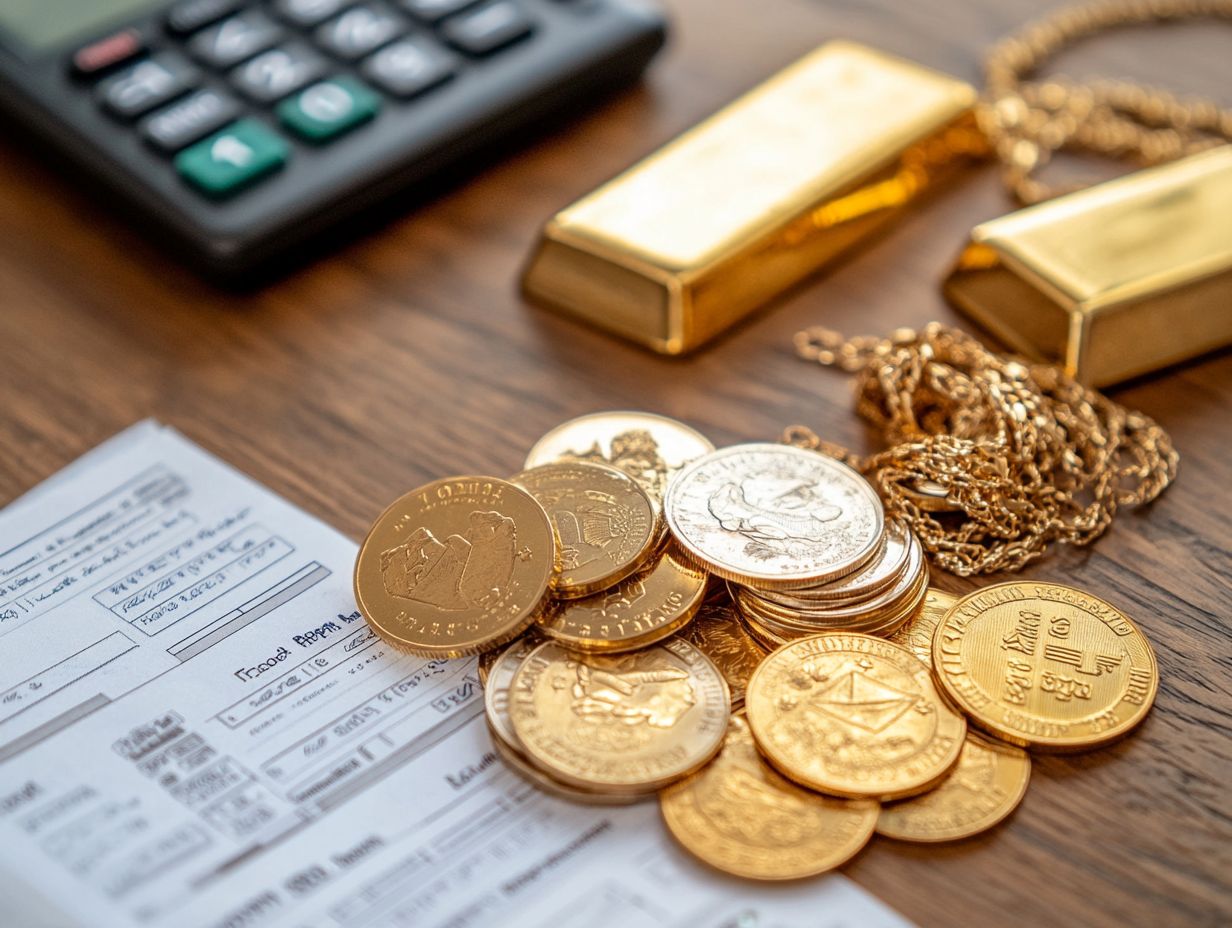
Properly reporting your precious metal sales on your taxes is crucial for maintaining compliance and avoiding potential pitfalls with the IRS.
By keeping accurate records and providing thorough reports, you ensure that all your investment expenses are accounted for. This diligence allows for precise calculations of taxes owed, ultimately safeguarding you against any unwelcome surprises in your tax liabilities.
Proper Documentation and Record-Keeping
Proper documentation and record-keeping are essential when reporting your precious metal sales to the IRS, ensuring that every investment expense is accurately accounted for.
By maintaining detailed records, you not only enhance tax compliance but also gain a comprehensive view of asset movements within your investment portfolio.
Collecting and organizing vital documents is crucial. This includes keeping track of purchase receipts, sale confirmations, and any expenses incurred during transactions.
For example, holding onto invoices for storage fees or authentication costs can significantly influence your overall taxable capital gains (profits that may be taxed when you sell your assets) calculation.
It s advisable to store these records securely yet accessibly, ideally in both physical and digital formats. This ensures you can easily retrieve them when preparing your tax returns.
By thoroughly documenting each transaction, you protect yourself against potential audits and pave the way for a smoother reporting process when tax season rolls around.
Alternative Options for Selling Precious Metals
Exploring alternative options for selling precious metals can unveil new investment opportunities and connect you with a diverse range of market participants, enriching your overall selling experience.
It’s essential for you to thoughtfully evaluate the methods at your disposal, whether it s engaging in direct sales with precious metal dealers or exploring online selling options.
Exploring Other Ways to Sell
Exploring alternative avenues for selling precious metals goes beyond the usual channels, providing you with the flexibility to choose from options like precious metal dealers and online marketplaces.
Each method comes with its own set of advantages and challenges that can significantly influence the success of your sale.
For example, working with precious metal dealers can provide immediate cash without the hassle of online listings.
However, be prepared for lower offers due to the extra amount dealers charge on top of the market price.
On the flip side, exploring online marketplaces can potentially fetch you higher prices through competitive bidding and direct sales, although it does demand more effort on your part in terms of marketing and managing the transaction process.
Another option is trading stocks linked to gold and silver investments, allowing you to benefit from market fluctuations without the need to physically sell your metals.
While this method may carry less risk, it might not be as rewarding for those eager to capitalize on immediate sales.
Each of these options aligns with different investor strategies, striking a balance between convenience, risk, and potential returns.
Frequently Asked Questions
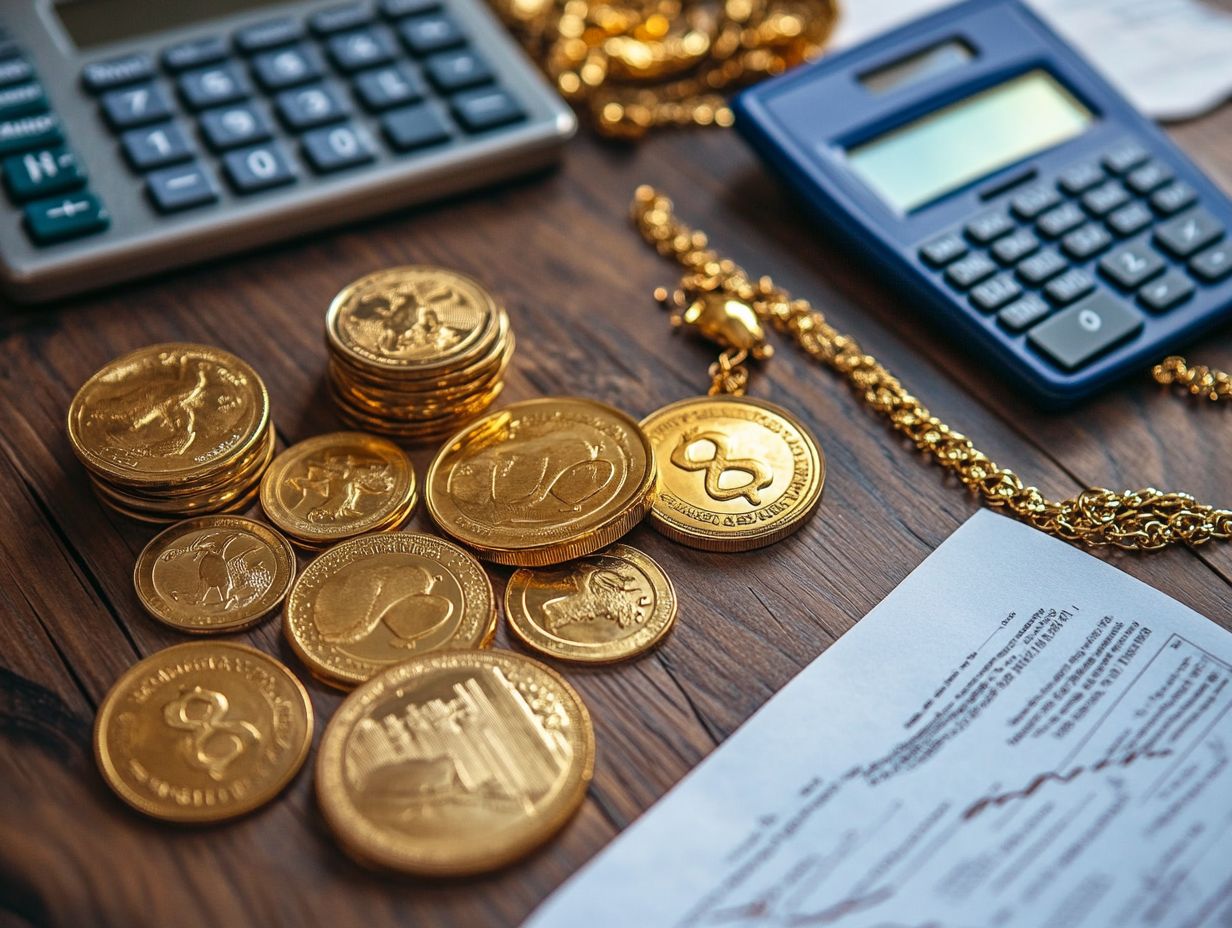
What are the tax implications of selling my precious metals collection?
The sale of precious metals is considered a capital gain and may be subject to taxes depending on your individual tax situation. It is important to consult with a tax professional for specific guidance.
Do I have to pay taxes on the sale of my precious metals collection?
Yes, you may be subject to paying taxes on the sale of your precious metals collection. The amount of taxes owed will depend on various factors such as the original purchase price, length of ownership, and your tax bracket.
What tax rate will I be subject to for selling my precious metals collection?
The tax rate for selling precious metals is based on your individual income tax rate, which can range from 0% to 37%. Short-term gains (holding for less than a year) are taxed at your regular income tax rate, while long-term gains (holding for more than a year) are taxed at a lower rate.
Are there any exemptions or special rules for selling precious metals?
Certain exemptions or special rules may apply if you are selling precious metals for personal use or if you are considered a collector or dealer. It is important to consult with a tax professional to determine your specific situation.
What documentation do I need to keep for tax purposes when selling my precious metals collection?
It is important to keep records of the original purchase price and date of acquisition for each item in your precious metals collection. You may also need to provide documentation of the sale price and date of sale for tax purposes.
Don’t miss out on these exciting opportunities! Start organizing your records today for a smoother tax season!
Can I claim a loss on my taxes if I sell my precious metals collection for less than what I paid?
Selling your precious metals collection for less than you paid might allow you to claim a capital loss on your taxes. A capital loss occurs when you sell an asset for less than its purchase price.
There are limitations to this process, so consulting a tax professional is essential. Want to know how to make the most out of your situation? Understanding capital losses can help you save on taxes!












